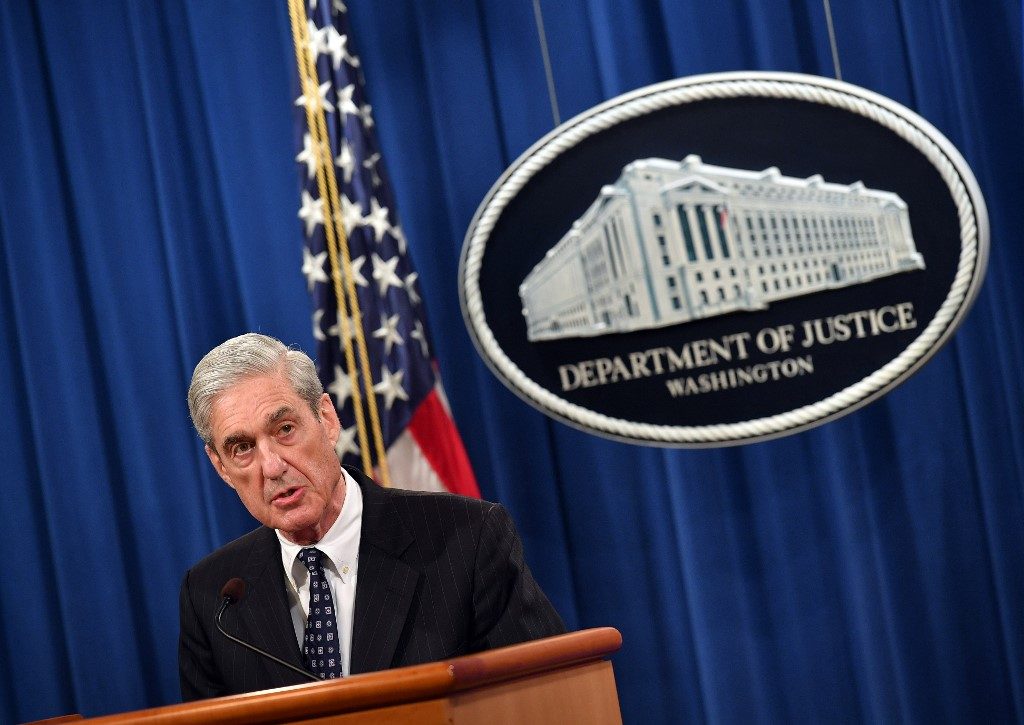SUMMARY
This is AI generated summarization, which may have errors. For context, always refer to the full article.

WASHINGTON, USA – For nearly two years, Robert Mueller remained behind the scenes, out of public view as his team of crack attorneys and FBI agents carried out an investigation which could determine the fate of President Donald Trump.
The former FBI director broke his silence on Wednesday, May 29, to announce he was closing the Special Counsel’s Office and returning to private life after completing one of the most politically charged investigations in US history.
And the 74-year-old Mueller remained true to his enigmatic self in his first public remarks since issuing an exhaustive 448-page report into Russian interference in the 2016 presidential election.
Mueller said longstanding Justice Department policy prohibited him from charging a sitting president with a crime.
But, he added, “if we had had confidence that the president clearly did not commit a crime, we would have said so.”
Mueller suggested that any further action against Trump for obstruction of justice now lies with Congress, which has the power to impeach the chief executive.
And with that, the tall, gray-haired career law enforcement official sought to walk away from the leading role he has played in the political drama gripping Washington.
The Russia probe was not Mueller’s first appearance on center stage.
As a Marine wounded in Vietnam and decorated for heroism, a dogged prosecutor and then director of the FBI, Mueller built a reputation as one of the most respected members of Washington’s powerful legal elite.
He was for most observers the ideal choice to lead the Russia investigation, a probe in which for nearly two years he held the president’s political fate in his hands.
Mueller has a reputation of being an exacting and tough taskmaster, and despite his early Republican political alignment, a straight-shooter who was appreciated by politicians of both political parties.
Mueller had worked under extreme pressure, political and public, in the past.
He became director of the Federal Bureau of Investigation just days before the September 11, 2001 Al-Qaeda attacks on New York and Washington, which plunged the bureau into an entirely new mission to protect the country from terror plots.
Meuller led the FBI for the next 12 years, during which time he built up the bureau’s counter-terror mission but had some notorious problems, including a botched anthrax investigation and a poorly functioning intelligence unit.
Legacy tied to Russia probe
After retiring in 2013, he joined a private Washington law practice where he took on official arbiter missions, including an external investigation of the National Football League’s mishandling of assault allegations against a star player, and reviewing security controls at intelligence contractor Booz Allen Hamilton after several of its employees stole highly confidential national security information.
His investigation into the 2016 presidential election detailed numerous questionable contacts between the Trump campaign and Russia, while deciding they did not add up to criminal conspiracy.
And it detailed multiple acts by Trump to interfere with the investigation – and chose, finally, not to decide whether those added up to criminal obstruction of justice.
But nowhere does the huge report give any sense of what Mueller himself thinks or feels about Trump himself, the target of the investigation which took up 22 months of his life.
Even with that distinguished career, Mueller’s reputation will be tied forever to how he handled the Russia probe, with Washington insiders and others forever speculating on whether he could have been more aggressive in his prosecution.
The investigation gave him an insider’s look at the way Trump’s White House worked, and he endured constant personal attacks from the president.
Trump labelled the probe a “witch hunt” and “coup” attempt against the presidency and accused Mueller of political bias.
Yet for the entire period Mueller remained invisible and silent, speaking only through the court filings his team made that laid charges against 26 Russians and 6 former Trump aides.
None of the 6 were charged with anything having to do with collusion with Russia.
Several Democratic presidential candidates and members of Congress seized upon Mueller’s remarks on Wednesday to call for Trump’s impeachment but the former FBI director did so only in typically cryptic fashion.
“The Constitution requires a process other than the criminal justice system to formally accuse a sitting President of wrongdoing,” he said. – Rappler.com
Add a comment
How does this make you feel?
There are no comments yet. Add your comment to start the conversation.